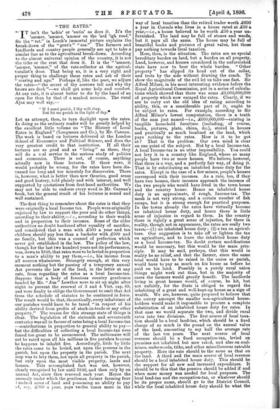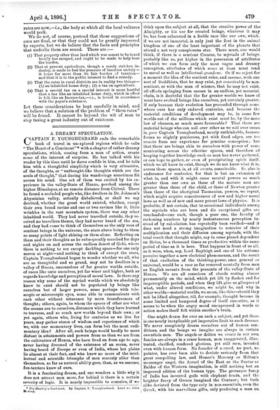" THE RATES."
isn't the 'ackin' or 'untin' as does it. It's the 'ammer, 'ammer, 'ammer on the 'ard 'igh road." So the " vet." in Leech's immortal picture explains the break-down of the " gent's " " oss." The farmers and landlords and country people generally are apt to take a similar line as to the agricultural break-down. According to the almost universal opinion of the country, it is not the tithe or the rent that does it. It is the "'ammer, 'ammer, 'ammer," of the rate-collector at the agricul- turalist's door. That being so, it is a. very right and proper thing to challenge those rates and ask of their 4‘ rearing and age." Perhaps if, like the poet, we adjure the rates—" the secret of thy sorrows tell and why thy brows are dark "—we shall get some help and comfort. At any rate, it is almost better to die by the hand of an open foe than by that of a masked assassin. The rural Ajax may well say,- " If I must perish, I thy will obey, But let me perish in the light of clay.* Let us attempt, then, to turn daylight upon the rates. In doing so the ordinary reader will be greatly helped by the excellent little volume on " The History of Local Rates in England" (Longmans and Co.), by Mr. Cannan. The work is based on lectures delivered at the London School of Economics and Political Science, and does the very greatest credit to that institution. If all their lectures are as good and as "living" as these, they will do a n al service to the serious study of politics and economics. There is not, of course, anything actually new in these lectures. If there were, it would probably be wrong, for the rates have been dis- cussed too long and too minutely for discoveries. There is, however, what is better than new theories, good sense and good history, told plainly and with interest, and well supported by quotations from first-hand authorities. We clay not be able to endorse every word in Mr. Caiman's book, but the general result of his lectures is sound and well sustained.
The first thing to remember about the rates is that they were originally a local Income tax. People were originally enjoined by law to support the poor and do other things, according to their ability,—i e., according to their wealth and in proportion to their incomes. Some of the older authorities no doubt hankered after equality of sacrifice, and considered that a man with £500 a year and ten .children should pay less than a bachelor with £500 and co family, but this was a counsel of perfection which never got established in the law. The policy of the law, though for the last two hundred years not its performance, was, down to 1840, that rates were to be levied in proportion to a man's ability to pay them,—i.e., his income from all sources whatsoever. Strangely enough, at this very moment nothing but the passing of a temporary annual Act prevents the law of the land, in the letter at any rate, from regarding the rates as a local Income-tax. Suppose that a body of ferocious country gentlemen headed by Mr. "Jim" Lowther were to sit up night after night to prevent the renewal of 3 and 4 Viet. cap. 89, and were finally to oblige the Government to omit that Act from the schedule of statutes to be continued in force. The result would be that, theoretically, every inhabitant of our parishes would have to be taxed " in respect of his ability derived from profits of stock-in-trade or any other property." The reason for this strange state of things is clear. The legislation of the sixteenth and seventeenth centuries was all in favour of rates being a local Income-tax —contributions in proportion to general ability to pay— but the difficulties of collecting a local Income-tax were found too great to be surmounted. The millionaire will not be rated upon all his millions in five parishes because he happens to inhabit five. Accordingly, little by little the rates came to be levied, not upon the persons in the parish, but upon the property in the parish. The next step was to levy them, not upon all property in the parish, but only upon the most visible property, lands and houses. This accomplished fact was not, however, clearly recognised by law until 1840, and then only by an annual Act, since then renewed each year. Hence the anomaly under which the gentleman farmer farming four t und red acres of land and possessing an ability to pay 41f, say, £300 a year, pays twelve times more in the way of local taxation than the retired trader worth £600 a year in Consols who lives in a house rated at £50 a year,—i.e., a house believed to be worth £50 a year un- furnished. The land may be full of stones and weeds, but it pays all the same. The house may be full of beautiful books and pictures of great value, but these pay nothing towards local taxation.
Here, then, is the situation. The rates are no special hereditary burden on land, but a burden on all property. Land, however, and houses considered in the unfurnished state have now to bear the whole burden. " Other property " has slipped its head out of the collar, and trots by the side without drawing the coach. To show the magnitude of the evil let us take one fact. Sir Alfred Milner, in his most interesting evidence before the Royal Agricultural Commission, put in a series of calcula- tions which showed that there was some £6,000,000,000 of property which now escaped the rates. Clearly, if we are to carry out the old idea of rating according to ability, this, or a considerable part of it, ought to be subject to rates. For example, according to Sir Alfred Milner's lowest computation, there is a tenth of the sum just named—i.e., £600,000,000—existing in tangible household furniture (including, of course, books, pictures, plate, china, &c.), stored in houses and practically as much localised as the land, which pays nothing to the rates. How is it to be got at ? That is the problem. Our own mind is clear on one point of the subject. Not by a local Income-tax. A local Income-tax is an utter impossibility. You could not levy it in a country like England, where so many people have two or more houses. We believe, however, that there is a way, and a perfectly fair way, of doing it. That is by substituting an inhabited house duty for the rates. Except in the case of a few misers, people's houses correspond with their incomes. As a rule, too, if they have two houses, their incomes approach the incomes of the two people who would have lived in the town house and the country house. Hence an inhabited house duty is an approximate, if rough, Income-tax. The mesh is not very strong, and a certain number of fish escape, but it is strong enough for practical purposes. In the towns already the rates have virtually become an inhabited house duty, and hence there is little sense of injustice in regard to them. In the country there is rightly a great sense of injustice, for there in reality, though not in appearance, the rates are really two taxes,—(1) an inhabited house duty ; (2) a tax on agricul- ture. Our suggestion is to take off or lighten the tax on agriculture, and to leave the inhabited house duty as a local Income-tax. No doubt certain modifications would be necessary, but this would be the main prin- ciple. It may be said, perhaps, that this would in reality be no relief, and that the farmer, since the same total would have to be raised in the union or parish, would have to pay as much on his house as before he paid on his land. Possibly in a purely rural union things might work out thus, but in the majority of cases the farmers would greatly benefit. The landlords living in great houses would, of course, be hit, but not unfairly, for the State is obliged to regard the inhabiting of a great and well-kept-up house as a sign of wealth. We are, however, quite prepared to believe that the outcry amongst the smaller non-agricultural house- holders would make it impossible to procure a complete substitution of an inhabited house duty for rates. In that case we would separate the two, and divide rural rates into two divisions. The first source of local taxa- tion should be a local land-tax, which should be a fixed charge of so much in the pound on the annual value of the land, amounting to say half the average rate of the last ten years. The next source of local revenue should be a fixed occupation-tax, levied on premises not inhabited but now rated, and also on coal- mines, underwoods, tithe, and other miscellaneous rateable property. Here the rate should be the same as that on the land. A third and the main source of local revenue should be a local inhabited house duty. This should be the support for all new and increased expenditure. It should be to this that the pennies should be added if and when more money was needed for local purposes. The local land-tax and the occupation-tax, or whatever should be its proper name, should go to the District Council, while the local inhabited house duty should be what the rates are now,—i.e., the body at which all the local vultures would peck.
We do not, of course, pretend that these suggestions of ours are final, or that they could not be greatly improved by experts, but we do believe that the facts and principles that underlie them are sound. These are :-
(1) That property other than land which was meant to be taxed locally has escaped, and ought to be made to help bear the burden.
(2) That at present agriculture, though a sorely stricken in- dustry, is made to feel the pressure of taxation unduly— it bears far more than its fair burden of taxation— and that it is to the public interest to find a remedy.
(3) That the rates in rural districts are in reality two things— (1) an inhabited house duty; (2) a tax on agriculture.
(4) That a special tax on a special interest is more hurtful than a tax like an inhabited house duty, which in effect is felt like an Income-tax,—i.e., is levied in accordance with the payer's substance.
Let these considerations be kept carefully in mind, and we believe that a solution of the problem of " them rates " will be found. It cannot be beyond the wit of man to stop taxing a great industry out of existence.



































 Previous page
Previous page